- Program
- Speakers
- Who's Attending
- TPM Community
- Partners
- Media
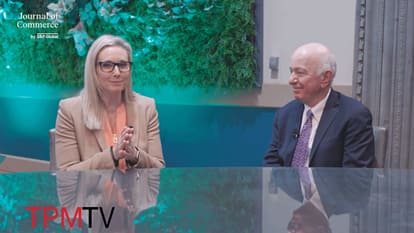
TPM TV
Episodes of exclusive TPM content featuring interviews of key stakeholders and attendees.
WATCH NOW - About

About TPM
The must-attend conference for the trans-Pacific and global container shipping and logistics community
LEARN ABOUT TPM - FAQ's
- Get Updates
- Register
The TPM21 agenda features 7 content tracks. Please scroll down for more information.
TRACK: GENERAL SESSION

A Special Dialogue With Bill Gates
In partnership with TPM21 sister event CERAWeek, Daniel Yergin, vice chairman of IHS Markit, engages in a one-on-one discussion with Bill Gates on climate change and its impact on energy transition.
Session Chair:
Daniel Yergin, Vice Chairman, IHS Markit
Speakers:
Bill Gates, Co-Chair of the Bill & Melinda Gates Foundation, and Founder, Breakthrough Energy
TRACK: ADAPTING TO NEW OCEAN SHIPPING DYNAMICS
- What does it take to be an ocean shipper of choice?
- How can shippers provide better and more frequent volume forecasts to carriers?
- What are the major pain points for carriers and how should shippers adjust?
- How do shippers gain access to decision-makers at container lines?
- What is the reality of trans-Pacific carriers’ pricing power?
- Should shippers rethink the number of carriers and forwarders they contract with?
- What strategies can help shippers guarantee more capacity without paying significantly higher rates?
- How can shippers constructively address service reliability in contract negotiations?

The Trans-Atlantic Outlook
The traditionally stable trans-Atlantic business does not suffer the extreme price and volume volatility experienced on the peak season-driven trans-Pacific and Asia-Europe lanes, but it’s not immune to the problems those trades face, either. Even as strong demand in the US for beverages, furniture, and spare parts fills westbound vessels, the equipment shortages causing such chaos on routes out of Asia are leading to worsening bottlenecks at ports across Europe and North America. With schedule reliability already at low levels, carriers are skipping calls at the heavily congested UK ports of Felixstowe and Southampton, both crucial calls on the trans-Atlantic services. UK-bound containers are instead offloaded in Europe, adding days, and sometimes weeks, to the transit time. On the other side of the Atlantic, dwell times at terminals in the US and Canada, and chassis dwell times at inland warehouses, are adding to container turnaround and lengthening voyage transit times. This session will analyze the state of the trans-Atlantic trade and address the following questions:
How long will these disruptions impact imports and exports across the Atlantic?
Is it inevitable that the equipment and reliability issues will at some point start to drive up rates?
Session Chair:
Greg Knowler, Senior Editor, Europe, JOC, Maritime & Trade, IHS Markit
Speakers:
Alison Leavitt, Managing Director, Wine and Spirits Shippers Association
Holger Oetjen, Senior Director, Trade Management Atlantic, Hapag-Lloyd
Want to chat with our speakers? Join this session on Thursday, Feb. 25 from 2:00-2:30pm ET and engage in the chat room
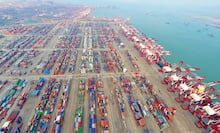
The North American Export Outlook
US exporters are challenged by tariffs, a strong dollar versus the currencies of major trading partners, increasing freight rates in the westbound trans-Pacific, and equipment shortages. Agricultural exporters in the US interior face particular disadvantages because shipping lines are expediting the return of empty containers to Asia to be refilled with higher-paying US merchandise imports rather than repositioning the empty containers to export facilities in the Midwest. With a new administration in place, however, the trade outlook is expected to center on developing export markets rather than engaging in trade wars. This session will analyze the outlook for US containerized exports and the system that serves them.
Session Chair:
Bill Mongelluzzo, Senior Editor, West Coast, JOC, Maritime & Trade, IHS Markit
Speakers:
Ken Eriksen, Senior Vice President, Agribusiness, IHS Markit
Terry Glass, Executive Director, Plastics, IHS Markit
Want to chat with our speakers? Join this session on Thursday, Feb. 25 from 12:25-12:55pm ET and engage in the chat room.
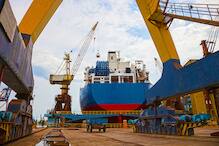
Securing Outbound Equipment: Advice for Exporters
With US import freight rates from Asia at least five times the export rates, carriers continue to turn down export loads in favor of imports. The result is a severe shortage of containers for exporters. So how should exporters go about securing the equipment and vessel space they need? Options include index pricing and arranging street turns in which an import container that is unloaded is matched with an export load. The so-called matchback is arranged before the empty container is returned to the marine terminal. This session will explore strategies exporters can employ as a seasonal lull in imports that begins with the Lunar New Year on Feb. 12 motivates carriers to make more equipment available to exporters.
Session Chair:
Bill Mongelluzzo, Senior Editor, West Coast, JOC, Maritime & Trade, IHS Markit
Speakers:
Bill Rooney, Vice President, Strategic Development, Kuehne + Nagel
Edward Zaninelli, President, Griffin Creek Consulting
Want to chat with our speakers? Join this session on Thursday, Feb. 25 from 1:00-1:30pm ET and engage in the chat room
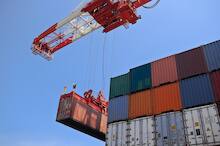
Becoming an Ocean Shipper of Choice: What Does It Take to Get Your Cargo Loaded?
There’s little chance that the Trans-Pacific space limitations North American importers faced in the second half of 2020 will disappear in 2021, as carriers have demonstrated an ability to quickly scale back capacity when demand falls. Agreeing to higher contract rates is by no means a solution, nor is it a guarantee against rolling of cargo to later sailings. For shippers, the issue is increasingly one of adjusting by finding ways to work collaboratively with carriers, in effect by becoming an ocean shipper of choice. Shippers, for example, can improve volume forecasts and work with their carriers to ensure they’re delivering on what their partners need to be efficient. This session will explore how shippers can ensure they get the best service from carriers, while answering the following questions:
Session Chair:
Mark Szakonyi, Executive Editor, JOC, Maritime & Trade, IHS Markit
Speakers:
Rachael Acker, Logistics Director, Wolverine Worldwide
Bryan Most, Senior Vice President, Retail, New York Shipping Exchange, and former Vice President, Transportation, Walmart Stores
Hardy Pearson, Senior Vice President, Sales and Customer Service, Hapag-Lloyd AG
Want to chat with our speakers? Join this session on Thursday, Feb. 25 from 2:00-2:30pm ET and engage in the chat room

Contracting Amid a New Balance of Power
Rapid consolidation has helped breed capacity discipline among container lines, shifting the balance of power away from shippers to carriers. Carriers aren’t just enjoying higher rates but there’s less pressure on them to make commercial accommodations such as extra free time or budging on minimum quantity commitments. Having seen such discipline keep eastbound trans-Pacific spot rates at record levels in the second half of 2021, carriers are reluctant to expand MQCs within trans-Pacific service contracts. Low levels of eastbound ocean reliability coupled with Los Angeles-Long Beach port congestion, though, have sharpened shippers’ focus on reliability. Shippers who can recognize the changing balance of power and rethink how they guarantee capacity can better weather the shifting winds. This timely session will answer these questions and more:
Session Chair:
Mark Szakonyi, Executive Editor, JOC, Maritime & Trade, IHS Markit
Speakers:
James Caradonna, General Manager, Pricing/Americas, M&R Forwarding and Multi-Container Line
Stephanie Loomis, Vice President, FCL Product, Vanguard Logistics Services
John Westwood, Senior Manager, Transportation Practice, Chainalytics
Want to chat with our speakers? Join this session on Thursday, Feb. 25 from 2:35-3:05pm ET and engage in the chat room

NVOs in the Crosshairs — How Maersk Is Changing the Game
The sheer volume of new products and innovations Maersk has introduced in the past year is placing on notice a number of entities that used to view the Copenhagen-based company as purely a vessel operator. That includes software providers, freight marketplaces, and non-asset-based 3PLs. But it’s NVOs that might be most challenged by Maersk ramping up its “container logistics integrator strategy” to more directly target shippers that typically turn to NVOs for capacity and ancillary services. And Maersk isn’t alone among container lines in wanting a bigger share of the revenue on each shipment. How should NVOs think about this threat, and what role can they continue to play for shippers in an environment where container lines are attempting to reinvent themselves as end-to-end service providers?
Session Chair:
Eric Johnson, Senior Editor, Technology, Maritime & Trade, IHS Markit
Speakers:
Eytan Buchman, Chief Marketing Officer, Freightos
Shabsie Levy, CEO, Shifl
Michael S. Nielsen, Founder and FreightTech Advisor, Michael S. Nielsen Advisory
Want to chat with our speakers? Join this session on Friday, Feb. 26 from 12:00-12:30pm ET and engage in the chat room.

The Tariff Turnstile: Should Shippers Reverse Course on China?
Despite punishing tariffs of as much as 25 percent on a variety of import merchandise from China, the relentless growth in online shopping by American consumers resulted in more than a 20 percent year-over-year increase in US imports from China in the second half of 2020. The past two years have demonstrated that while some production has shifted from China to Southeast Asia, manufacturers in those countries don’t have the trained labor force or access to extensive inland and port infrastructure that exporters in China enjoy. As consumer demand for products ordered online grows, China has the production capacity and sophisticated supply chain network necessary for Chinese manufacturers to immediately ramp up production to meet demand. This discussion will analyze what’s next in the US-China trade relationship and how shippers should approach their sourcing decisions in the years ahead.
Session Chair:
Bill Mongelluzzo, Senior Editor, West Coast, JOC, Maritime & Trade, IHS Markit
Speakers:
Jon Monroe, President, Jon Monroe Consulting
Matt Priest, President and CEO, Footwear Distributors & Retailers of America
Want to chat with our speakers? Join this session on Friday, Feb. 26 from 1:00-1:30pm ET and engage in the chat room
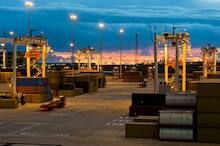
Planning Supply Chains for the 2022 West Coast Contract Negotiations
Negotiations for the new ILWU contract, which expires on July 1, 2022, will begin in about one year. Employers and the ILWU, however, realize they must begin immediately to build trust with trans-Pacific shippers so they don’t divert cargo to East and Gulf Coast ports next year. Because further automation of West Coast marine terminals is likely to again play an important role in the contract negotiations, both parties may want to informally discuss their options for tackling this contention issue. After proving their ability to handle unprecedented cargo volumes this past year even as the COVID-19 virus spread throughout the region, West Coast longshore workers have proven their ability and willingness to work with employers under difficult circumstances. This critical session will take the temperature of how West Coast longshore negotiations are likely to unfold, and how shippers and their service providers should prepare.
Session Chair:
Bill Mongelluzzo, Senior Editor, West Coast, JOC, Maritime & Trade, IHS Markit
Speakers:
Rick Gabrielson, Advisor, Lighthouse Maritime Advisors
Jonathan Gold, Vice President, Supply Chain and Customs Policy, National Retail Federation
Gene Seroka, Executive Director, Port of Los Angeles
Want to chat with our speakers? Join this session on Thursday, Feb. 25 from 4:35-5:05pm ET and engage in the chat room

Approaching the 2021 Contract Season: Ocean Tender Conundrums and Options
Given that shippers are entering a vastly different ocean carrier contract environment this year, with carrier capacity discipline a “game changer,” according to Drewry’s Philip Damas, it makes sense for shippers to challenge assumptions about how to approach the bid process. According to Damas, key considerations will include security of capacity during the next contract year; bid timing given ongoing pricing and capacity constraints; contract duration; volume commitments; and finally rate expectations — if you pay more, will you at least get a more reliable service? Through its Supply Chain Advisory service that Damas leads, Drewry has been advising shippers for several years and he will come to TPM21 ready to discuss the key issues and challenges that shippers will face in contract negotiations over the next few months.
Session Chair:
Peter Tirschwell, Vice President, Maritime & Trade, IHS Markit
Speakers:
Philip Damas, Managing Director, Drewry, and Operational Head, Drewry Supply Chain Advisors
Want to chat with our speakers? Join this session on Wednesday, March 3 from 11:00-11:30am ET and engage in the chat room
TRACK: MANAGING FLOW THROUGH THE PORT COMPLEX
- How trucking companies are handling the surge of containers
- How difficult it is to find a chassis, make an appointment, and pick up exports from railyards, and advice about how to navigate the processes
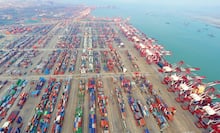
Port Flow - The Overall State of Play
As of late 2020 the system was in an historic state of crisis. Containers out of position, chassis shortages, terminals chock-a-block and trucker productivity greatly reduced. Importers expecting heavy volumes through Chinese New Year were in a desperate search for vessel capacity. Even if the situation eased, getting the system back into balance is expected to take months. What is the state of play as of TPM and what does 2021 look like?
Session Chair:
Bill Mongelluzzo, Senior Editor, West Coast, JOC, Maritime & Trade, IHS Markit
Speakers:
David Arsenault, President, Logistics Transformation Solutions
Alan McCorkle, President and CEO, Yusen Terminals
Want to chat with our speakers? Join this session on Friday, Feb. 26 from 2:45-3:15pm ET and engage in the chat room
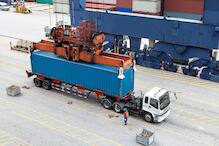
Managing Drayage Through the Top US Ports
Volume has been up double-digits through key US ports such as Los Angeles-Long Beach, New York-New Jersey, Virginia, and Savannah. Some have handled the crush better than others, and the level of communication among port authorities, terminal operators, dray drivers, and BCOs vary by port. This session will examine how each of the top ports have handled the cargo influx, including turning drivers around quickly, having enough equipment, and communicating the latest information to BCOs and dray drivers on choke points in a timely fashion. It also will explore what BCOs can do to ensure the least painful experience possible during this surge.
Session Chair:
Ari Ashe, Senior Editor, Intermodal Rail and Southeast Ports, JOC, Maritime & Trade, IHS Markit
Speakers:
Aaron Brown, Senior Vice President, California Cartage, NFI
Weston LaBar, President and CEO, Harbor Trucking Association, and President and CEO Ventures 52
Michelle Taylor, CEO, Taylor Logistics
Want to chat with our speakers? Join this session on Monday, March 1 from 3:35-4:05pm ET and engage in the chat room

Detention and Demurrage: Why Relationships Matter
The two-headed monster has reared its ugly head again. Beneficial cargo owners have complained yet again how this hot-button issue of fines and penalties for not picking up and returning containers in a timely manner has re-emerged, even after the Federal Maritime Commission urged cooperation between ocean carriers and BCOs. This session will take the temperature of the situation as the first quarter of 2021 winds down and as another peak season looms, while attempting to answer some critical questions: How can stakeholders come together to find ways to move forward together? What can BCOs do to work more effectively with dray partners and terminal operators to collaborate and find solutions rather than assigning blame?
Session Chair:
Ari Ashe, Senior Editor, Intermodal Rail and Southeast Ports, JOC, Maritime & Trade, IHS Markit
Speakers:
Lori Fellmer, Vice President, Logistics and Carrier Development, BassTech International
Jon Poelma, Managing Director, APM Terminals Elizabeth
Kurt Pruitt, Vice President, Pacifica Trucks
Want to chat with our speakers? Join this session on Friday, Feb. 26 from 12:25-12:55pm ET and engage in the chat room
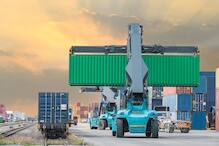
Bridging the Trust Divide: Making the Case for Cargo Visibility Portals
Every sector of the international supply chain agrees that greater visibility into shipment information is the key to improving cargo velocity and mitigating equipment shortages. There are a number of visibility tools sponsored by ports or provided by the private sector to guarantee this visibility. Due to a lack of trust among supply chain partners and the feeling that each company’s information should remain proprietary, however, community information portals aren’t reaching their full potential. This much-anticipated session will feature service providers who will make a case for establishing that trust and why it’s critical to improving cargo flow at North American ports.
Session Chair:
Bill Mongelluzzo, Senior Editor, West Coast, JOC, Maritime & Trade, IHS Markit
Speakers:
Lamia Kerdjoudj-Belkaid, Secretary General, Federation of European Private Port Companies and Terminals
Gene Seroka, Executive Director, Port of Los Angeles
Want to chat with our speakers? Join this session on Monday, March 1 from 4:20-4:50pm ET and engage in the chat room

Industrial Real Estate in the Covid-19 Era
Unlike the 2008-2009 recession when vacancy rates at warehouses and distribution centers increased 1.5 percentage points in one year, COVID-19 appears to have had little impact on industrial real estate fundamentals, according to CBRE’s Q3 2020 industrial and logistics report. The warehouse/distribution sector experienced its 42nd consecutive quarter of positive net absorption, and the vacancy rate nationwide was a healthy 4.7 percent as US imports from Asia flooded into the country. E-commerce fulfillment was a major driver of demand, both in primary markets and in secondary markets as last-mile delivery companies pushed product as close to the end-consumer as possible. Third-party logistics providers also contributed to increasing demand for warehouse and distribution space. Industry experts predict demand for industrial space will remain strong at least through 2021.This session will take a near-, mid- and long-term view of the sector.
Session Chair:
Bill Mongelluzzo, Senior Editor, West Coast, JOC, Maritime & Trade, IHS Markit
Speakers:
James Breeze, Global Head, Industrial Research, CBRE
Matt McGregor, Executive Vice President, Colliers International
Melinda McLaughlin, Vice President, Research, Prologis
Want to chat with our speakers? Join this session on Friday, Feb. 26 from 2:35-3:05pm ET and engage in the chat room
TRACK: THE RAIL AND TRUCKING OUTLOOK
- What can the intermodal industry do to better handle volume surges?
- How can capacity be better utilized?
- How much more are shippers paying for intermodal in 2021? Will those extra dollars be used for better service?

The Intermodal Outlook: Will Stability Return in 2021?
With major congestion on the US rail network out of the West Coast in the second half of 2020, what lessons can be learned to apply to the next surge? Union Pacific Railroad levied record fees on excess contract cargo off the West Coast. BNSF Railway rationed capacity in August and flew workers into Los Angeles from other markets to help out with the crush of volume. Meanwhile, other markets, such as Chicago, was on the other end as a key destination and railroads were unable to get back all the workers furloughed in the height of the pandemic. This session will evaluate the North American intermodal outlook and inform shippers what to expect in the coming year. Among the questions it will answer:
Session Chair:
Ari Ashe, Senior Editor, Intermodal Rail and Southeast Ports, JOC, Maritime & Trade, IHS Markit
Speakers:
Christopher Brach, Senior Vice President and General Manager, Radiant Logistics
Dr. Noel Hacegaba, Incoming Chairman, Intermodal Association of North America, and Deputy Executive Director and COO, Port of Long Beach
Mark McKendry, Vice President, North America Intermodal, NFI
Keith Reardon, Senior Vice President, Consumer Product Supply Chain, Canadian National Railway
Want to chat with our speakers? Join this session on Monday, March 1 from 3:00-3:45pm ET and engage in the chat room

Drayage in the Interior: How Are Conditions in Key Rail Hubs?
With a sharp resurgence in cargo in the second half of 2020, a shortage of available labor strained supply chains in the US interior. There weren’t enough yard workers in terminals, truck drivers to handle all the containers before rail demurrage (storage) kicked in, or warehouse workers to quickly unload and return empty containers for the next shipper. With a COVID-19 vaccine in place, providers and shippers can look to what the future looks like for resolving these critical labor issues and bring some efficiency back to inland hubs. This session will examine all parts of the experience in the inland rail yards what’s working and what isn’t, and how to overcome the challenges to the final mile.
Session Chair:
Ari Ashe, Senior Editor, Intermodal Rail and Southeast Ports, JOC, Maritime & Trade, IHS Markit
Speakers:
Mike Burton, President, C&K Holdings
Erin Graglia, Owner and General Manager, Wallport Transit Xpress
Jason Hilsenbeck, CEO, Loadmatch and Drayage.com
Ken Joy, General Manager, Rose Transportation
Want to chat with our speakers? Join this session on Monday, March 1 from 4:05-4:35pm ET and engage in the chat room

Trucking 2021: What Will the Market Look Like?
After a turbulent 2020, the coming year looks no less volatile, but surprises may be in store as the US comes out of recession and tries to beat the COVID-19 pandemic with vaccines. How will demand affect capacity, and how will capacity affect pricing and service? Will the pricing pendulum swing again? How can we get better efficiency and utilization from existing capacity?
Session Chair:
William B. Cassidy, Senior Editor, Trucking, JOC, Maritime & Trade, IHS Markit
Speakers:
Greg Orr, President, CFI, and Executive Vice President, Truckload, TFI International
Holly Pearce, Director, Distribution and Logistics, Agway Farm and Home Supply
Mike Regan, Chief Relationship Officer, Tranzact Technologies
Tom Schmitt, Chairman, President, and CEO, Forward Air
Want to chat with our speakers? Join this session on Friday, Feb. 26 from 2:00-2:45pm ET and engage in the chat room

Managing Parcel Shipping Amid Surging E-Commerce Demand
As e-commerce plays a bigger role in retail sales, shippers face rising shipping costs, last-mile capacity constraints, and faster last-mile delivery expectations. Creative solutions such as curbside pickup, robots, and even drones are being utilized but how can shippers manage parcels, including returns, without breaking the bank and while maintaining excellent customer satisfaction?
Session Chair:
Cathy Morrow Roberson, Senior Editor, Parcel and Last Mile, JOC, Maritime & Trade, IHS Markit
Speakers:
Gina Anderson, Vice President, Solutions and Growth, City Delivery, Geodis
Mike Erickson, CEO, AFMS Logistics Management Group
Want to chat with our speakers? Join this session on Tuesday, March 2 from 1:35-2:05pm ET and engage in the chat room

Creating Flexible Shipper-Provider Partnerships Without Breaking the Bank
Partnerships, collaboration, being a shipper or carrier “of choice:” All have been cited as the best way to control transportation costs and be as efficient as possible. Relationships among freight partners have never been as stressed as they were in 2020. How can shippers, 3PLs, and carriers of all types hold partnerships together in 2021?
Session Chair:
William B. Cassidy, Senior Editor, Trucking, JOC, Maritime & Trade, IHS Markit
Speakers:
Ed Burns, Founder and President, Burns Logistics Solutions
Brian Fielkow, CEO, Jetco
John Janson, Global Logistics Director, Sanmar
Jeffrey Tucker, CEO, Tucker Company Worldwide
Want to chat with our speakers? Join this session on Monday, March 1 from 2:30-3:00pm ET and engage in the chat room
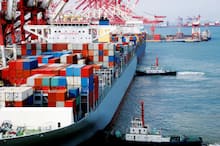
Sourcing Transloading Capacity
Transloading, the practice of unloading containers near ports of entry and then reloading goods into tractor-trailers or 53-foot domestic containers rather than sending them hundreds or thousands of miles inland, is becoming more important for importers and shipping lines at seaports and the US-Mexican border. Capacity needed to move international freight inland is a core issue, but so is getting international containers back to shipping lines and factories in Asia for reloading. This panel will examine the ins and outs of transloading, and where and why it works best for shippers and their partners.
Session Chair:
William B. Cassidy, Senior Editor, Trucking, JOC, Maritime & Trade, IHS Markit
Speakers:
Dan L. Gardner, President, Trade Facilitators Inc.
Todd Larson, Chief Operating Officer, STG Logistics
John Trestrail, Senior Manager, Supply Chain Optimization, Transportation and Logistics, Newell Brands
Want to chat with our speakers? Join this session on Monday, March 1 from 2:30-3:00pm ET and engage in the chat room

Dedicated vs. For-Hire Trucking: Finding the Right Mix
Dedicated contract carriage is becoming a bigger part of US trucking, with more over-the-road truckload carriers expanding dedicated operations. Shippers who want to ensure they have capacity when they need it are making dedicated a bigger part of their freight spend. But dedicated trucking also can change an entire distribution network in unexpected ways. This session will explore where dedicated trucking is best deployed and how that will change in 2021.
Session Chair:
William B. Cassidy, Senior Editor, Trucking, JOC, Maritime & Trade, IHS Markit
Speakers:
Brian Nessel, Senior Vice President, Carrier Relations and Capacity, GlobalTranz
Holly Pearce, Director, Distribution and Logistics, Agway Farm and Home Supply
Want to chat with our speakers? Join this session on Tuesday, March 2 from 3:20-3:50pm ET and engage in the chat room

How Technology Is Injecting Speed and Boosting Last-Mile Efficiency
As next-day and same-day deliveries become the norm, what’s next and how are shippers responding? This session will explore how technology is speeding up the last mile, how much faster it needs to be and how technology is linking the middle mile to the last mile to speed up final deliveries.
Session Chair:
Cathy Morrow Roberson, Senior Editor, Parcel and Last Mile, JOC, Maritime & Trade, IHS Markit
Speakers:
Karen Baker, Founder and CEO, ShipperHQ
Lior Sion, Founder and Chief Technology Officer, Bringg
Want to chat with our speakers? Join this session on Friday, Feb. 26 from 4:35-5:05pm ET and engage in the chat room

Managing Reverse Logistics in an E-Commerce World
As consumer buying rapidly gravitates toward e-commerce, the need for reverse logistics standards is increasing. That’s because as e-commerce surges so does the number of product returns, and the costs associated with those returns are skyrocketing. This session will analyze the costs associated with handling reverse logistics and best practices to reduce those costs.
Session Chair:
Cathy Morrow Roberson, Senior Editor, Parcel and Last Mile, JOC, Maritime & Trade, IHS Markit
Speakers:
Trish Boehm, Director of Operations, The Home Depot
Mark Geller, Co-Founder and Chief Operating Officer, Happy Returns
Tony Sciarrotta, Executive Director, Reverse Logistics Association
Want to chat with our speakers? Join this session on Tuesday, March 2 from 3:20-3:50pm ET and engage in the chat room
TRACK: DEVELOPING AN EFFECTIVE AIR CARGO STRATEGY

The Air Cargo Outlook — When Will Belly Capacity Return?
When half of the world’s air cargo capacity was pulled from service virtually overnight in late March as governments imposed travel bans to slow the spread of COVID-19 infections, it threw the market into disarray. Rates immediately soared to record highs, with added momentum from exploding demand for e-commerce as lockdowns imposed worldwide halted spending on services and drove up online shopping. Although airlines have subsequently activated large numbers of passenger planes as cargo-only carriers, and aircraft set to be retired have been retained, the demand for general air cargo will continue to outstrip available capacity through 2021, with vaccine transport adding to the space constraints. So is there any chance of stability in the air cargo market in the next year?
Session Sponsored By:
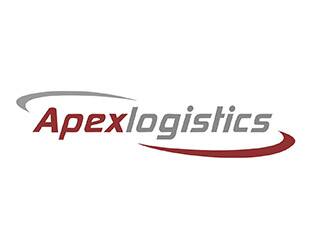
Session Chair:
Greg Knowler, Senior Editor, Europe, JOC, Maritime & Trade, IHS Markit
Speakers:
Glyn Hughes, Global Head of Cargo, IATA
Want to chat with our speakers? Join this session on Wednesday, March 3 from 11:40am-12:10pm ET and engage in the chat room

Utilizing Air Cargo in E-Commerce Last-Mile Strategies
Is air cargo a viable option for shippers developing a same day/next day delivery network? To be successful, it will need to be cost-effective for shippers but profitable for air cargo providers.
Session Sponsored By:

Session Chair:
Cathy Morrow Roberson, Senior Editor, Parcel and Last Mile, JOC, Maritime & Trade, IHS
Speakers:
Laura Behrens Wu, Founder and CEO, Shippo
Frederic Horst, Managing Director, Cargo Facts Consulting
Want to chat with our speakers? Join this session on Wednesday, March 3 from 1:15-1:45pm ET and engage in the chat room
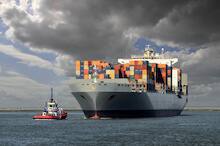
Best Practices in Airfreight Contracting: Block Space Agreements, Forward Freight Agreements, or Spot Market
Securing space at fixed prices in 2021 will be a challenge, with global vaccine volume competing with general air cargo for capacity limited by the lack of passenger flights and the belly cargo they provide. Airlines canceled all space agreements when travel bans grounded the passenger fleets in March, but in the last quarter of 2020 began to extend pricing validity to forwarders of up to three-month, with six-months even offered on rare occasions. But the space guarantees are coming at a steep price with huge uncertainty in demand unsettling the market. So what options are available for air cargo shippers to lock in both space and rates, what sort of duration is being offered, and what is the price of certainty?
Session Sponsored By:

Session Chair:
Greg Knowler, Senior Editor, Europe, JOC, Maritime & Trade, IHS Markit
Speakers:
Manel Galindo, CEO, WebCargo
Jan Kleine-Lasthues, Chief Operating Officer, Airfreight, Hellmann Worldwide Logistics
Peter Stallion, Air Cargo Derivatives Broker, Freight Investor Services
Want to chat with our speakers? Join this session on Wednesday, March 3 from 12:15-12:45pm ET and engage in the chat room
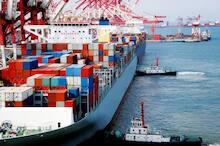
When Can Expedited Ocean Shipping Substitute for Air?
Securing access to extremely limited air cargo capacity on the trans-Pacific requires the services of global forwarders with the size and resources to lock in chartered freighters. But even if shippers can get the space required, fixed rates are only offered at a premium as airlines price in the market uncertainty. In this expensive and space constrained environment, alternatives to air have become highly attractive, with a host of expedited ocean services in heavy demand on the trans-Pacific. This session will explore when it makes sense to switch from air to ocean, what type of commodities can viably make the change, and whether any of that shifting volume is likely to remain once the air cargo capacity returns at scale.
Session Sponsored By:

Session Chair:
Greg Knowler, Senior Editor, Europe, JOC, Maritime & Trade, IHS Markit
Speakers:
William Villalon, President, APL Logistics
John Lauer, SVP and Chief Commercial Officer, Matson
Want to chat with our speakers? Join this session on Wednesday, March 3 from 11:00-11:30am ET and engage in the chat room
TRACK: COOL CARGOES — COLD-CHAIN CHALLENGES AND OPPORTUNITIES
- What is the state of play for supply and demand of reefer containers, gensets, and other equipment?
- With billions of dollars of private equity investment flowing into the cold chain, who are the players that will lead and grow on land, at sea, in IT, in owning assets, and in domestic transportation?
- As the world prepares to emerge from the COVID-19 pandemic, but with the transportation world more turbulent than ever, will the funding be there to meet future needs?
- How has a spree of acquisitions, led by Americold and Lineage Logistics, impacted cold storage?
- What strains has a shift to e-commerce put on infrastructure and equipment in the US and abroad?
- Are BCOs’ expectations being met when compared to the price they pay for moving cargo?
- What do refrigerated BCOs truly want and how willing are they to pay for reinvestment back for future growth?

The Cold Chain State of Play: Global Trends, Risks, and Opportunities
The COVID-19 pandemic has had a profound impact on the global food supply chain, both in the immediate and far-reaching disruption it caused in the spring and in the lasting changes emerging as large consumer countries such as the US begin to transition to a new normal. Consumers, for example, have moved dramatically toward online grocery shopping and direct-to-consumer food delivery. For example, logistics providers are reporting a dramatic move by consumers toward online grocery shopping and direct-to-consumer (DTC) food delivery. Just four years ago, the Food Marketing Institute estimated online food and beverage sales would reach $100 billion by 2025. At the beginning of 2020, prior to the COVID-19 pandemic, FMI revised that figure to $143 billion. With so many consumers still staying home to prevent the spread of the disease, that figure is likely to head even higher. Even before COVID-19 struck, the perishables supply chain was undergoing significant shifts, driven by the ongoing US-China trade battle, the International Maritime Organization’s low-sulfur fuel mandate, and tight supply for containers and other types of reefer equipment. With a tumultuous 2020 behind us, and a COVID vaccine seemingly on the way in early 2021, Thomas Eskesen, founder of cold-chain consulting company Eskesen Advisory and former head of reefer and specialized cargo at Maersk Line, will present the short- and long-term outlook for the global cold chain, with a focus on the trans-Pacific trade.
Session Chair:
Greg Knowler, Senior Editor, Europe, JOC, Maritime & Trade, IHS Markit
Speakers:
Thomas Eskesen, Founder, Eskesen Advisory
Helmuth Lutty, Senior Vice President, Shipping Operations, Del Monte Fresh Produce
Bruce Marshall, Global Head, Reefer Solutions, Maersk
Chris Swartz, Managing Director, AJC Logistics
Want to chat with our speakers? Join this session on Tuesday, March 2 from 2:45-3:30pm ET and engage in the chat room

Solving the Reefer Equipment Challenge: Will New Investment Keep Pace With Demand?
The global refrigerated perishable market continues to outpace overall trade growth, sparking a wave of merger and acquisition activity in the cold-storage sector and dramatically changing the landscape. Following in the footsteps of ocean carriers, terminals are investing at or around port facilities. Domestic over-the-road reefer trucking and rail is growing. Demand for refrigerated equipment investment is rocketing. And it won’t be long before smart technology, while an added value today, is a necessity. This session will explore the state of cold-chain investment and whether it will keep up with soaring demand, while answering the following questions:
Session Sponsored By:
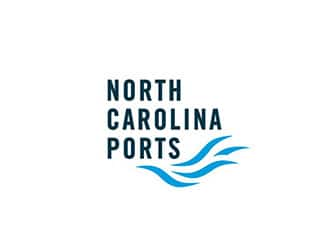
Session Chair:
Greg Knowler, Senior Editor, Europe, JOC, Maritime & Trade, IHS Markit
Speakers:
William C. Duggan, North American Cold Chain Advisor, Eskesen Advisory
Adam Forste, Managing Partner, Bay Grove Capital
Raul Saca, Head of Reefer Logistics Americas, DP World
Robert Sappio, CEO, SeaCube Container Leasing Ltd
Want to chat with our speakers? Join this session on Tuesday, March 2 from 12:15-1:00pm ET and engage in the chat room

What Do Refrigerated Shippers Really Want – and at What Price?
The global refrigerated perishables business has seen growth and expansion, in no small part because of the rise of the middle class and the reach of global carriers. Despite this expansion, freight rates have fallen over the years, rendering some of the largest commodity types, including proteins and bananas, to be marginally profitable for the carriers. Carriers have reacted by reducing services, limiting investment in container, gen-sets and other equipment; and reducing terms on contracts for free time and detention and demurrage. With the world, and the cold chain, having changed dramatically in the past year, this session will analyze the mood among refrigerated shippers and address these questions and more:
Session Chair:
Mark Szakonyi, Executive Editor, JOC.com and The Journal of Commerce, Maritime & Trade, IHS Markit
Speakers:
Dan Halstrom, President and CEO, U.S. Meat Export Federation
Ronald Hildebrandt, Vice President, Global Logistics, Trident Seafoods
Ed Treacy, Vice President, Supply Chain and Sustainability, Produce Marketing Association
Want to chat with our speakers? Join this session on Monday, March 1 from 12:15-12:45pm ET and engage in the chat room
TRACK: THE LOGISTICS TECHNOLOGY BREAKTHROUGH
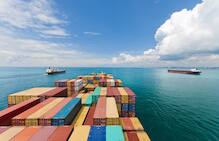
Seeing More Clearly? Assessing the Cost-Benefit Value of Container Sensors
Visibility is an ever-present need for shippers to consider as they weigh their investments in logistics technology. And the market has evolved into sophisticated strata focused on the value of the goods, the risks inherent in certain lanes, and the underlying need to have granular location and condition data about containers or the goods within them. This session will look at the various economic scenarios of these varying approaches to ocean freight visibility with a range of providers focused on different niches.
Session Chair:
Eric Johnson, Senior Editor, Technology, JOC, Maritime & Trade, IHS Markit
Speakers:
Robin Jaacks, Chief Commercial Officer and Managing Director, Ocean Insights
Don Miller, Chief Sales and Marketing Manager, Globe Tracker
Sascha Peyer, Co-Founder and Chief Revenue Officer, ClockWork Logistics Systems
Want to chat with our speakers? Join this session on Tuesday, March 2 from 2:45-3:15pm ET and engage in the chat room
TRACK: CASE STUDIES — UNCOVERING SHIPPER SUCCESS STORIES

Combating Disruption: A Case Study in Shipper-Carrier Collaboration
2020 proved that, even during pandemic-fueled lockdowns and ongoing trade wars, growth in global trade not only is resilient but also unpredictable, and that inevitably leads to disruption. Nowhere was the disruption more acute in 2020 than along the US West Coast, and specifically the Southern California gateway, where a surge of cargo overwhelmed ports, terminals, railyards, drayage operations, and other service providers in the second half of the year. Ships were forced to anchor outside the ports at a rate not seen since the tension-filled 2014-2015 contract negotiations. But as cargo jammed up, the intermodal rail network responded: Specifically, BNSF Railway flew workers in from other markets to help deal with the onslaught of cargo, working with its customers on sea and on land to keep the network viable and mitigating the risks of late delivery. This case study will illustrate the collaborative efforts among BNSF, J.B. Hunt Transport — its largest intermodal customer — OOCL, and shippers. It’s an example of collaboration that should serve as a model in overcoming the inevitable, and growing, disruptive forces in the modern freight supply chain.
Session Chair:
Ari Ashe, Senior Editor, Intermodal Rail and Southeast Ports, JOC, Maritime & Trade, IHS Markit
Speakers:
Paul Devine, Regional General Manager, North American Group, OOCL
Darren Field, EVP & President Intermodal, J.B. Hunt Transport Services
Anna Fisk, Manager, Distribution & Logistics, Kubota Tractor
Thomas Williams, Group Vice President, Consumer Products, BNSF Railway
Want to chat with our speakers? Join this session on Monday, March 1 from 4:00-4:35pm ET and engage in the chat room

Case Study: How Order Visibility Unifies Organizations and Their Partners
Importers are under serious strain from dynamics in and out of their direct control. One source of inefficiency comes from a lack of alignment between logistics control systems and processes that lie upstream from logistics, to the point where the purchase order is cut. This session, with experts from a major auto parts manufacturer and a software supplier, will explore how technology can bridge data and process gaps to give importers more control of the process, from the moment an order goes into production through the traditional logistics pipeline.
Session Chair:
Eric Johnson, Senior Editor, Technology, JOC, Maritime & Trade, IHS Markit
Speakers:
Jack Conaghan, Logistics Director, AutoZone
Rob Garrison, CEO, Mercado Labs
Want to chat with our speakers? Join this session on Tuesdasy, March 2 from 1:05-1:35pm ET and engage in the chat room
